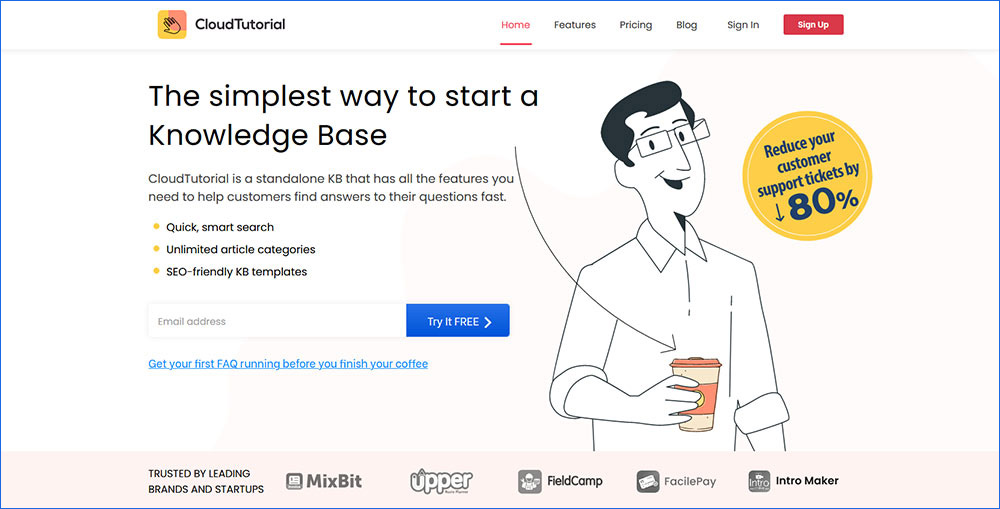For many companies, customer experience is the deciding factor over price.Creating a knowledge base software for business is a part of this great customer support experience. Choosing which knowledge management software to use is an important task as once decided and started to be used, it becomes difficult to switch later on. This is why we are here to help you decide. Keep reading!
Table of Content
Why You Need a Business Knowledge Base Software?
It’s all about a better customer experience.
Fact: 96% of customers admit customer service is an important factor when deciding their brand loyalty (source)
Solve Customers Issues Immediately
No matter if you are a startup or an enterprise, every customer wants their issue to be resolved instantly. Waiting for after-sales service agents to come online and reply to your query may increase frustration. Waiting is no longer an option.
This is where the knowledge base software for business comes into play. Properly written knowledge base articles help answer customers’ questions immediately without the need for any human intervention.
Easy Onboarding
The very first step when a prospect becomes a client is onboarding. As soon as the customers are handed over from sales to the onboarding team, they need to be taught a little about what are the next steps. Being new to the organization, they need product training and help to understand its mechanism.
A self-service knowledge base helps new clients through the onboarding process. You can create detailed instructions of how-tos with articles, videos, and documents and share them with customers to better understand what needs to be done.
Better SEO
Benefits of knowledge management systems also include better SEO. If your knowledge management software can answer visitor’s questions, customers are engaging with your content, and there are comments and positive feedback about your self-service efforts, the chances of better search engine rankings are high.
Google has shared that if your content is good, even if there are no other efforts to rank high, Google will rank your website higher. This helps develop authenticity and result in more people trusting your brand and signing up to do business with you.
What to Include in a Knowledge Base for Businesses?
A knowledge base can have:
- FAQ: Your knowledge base can have the frequently asked questions listed. This helps free up customer support agents’ time to focus on more pressing tasks.
- Onboarding details: This is the first step where clients interact with you as a customer. If a knowledge base contains an onboarding guide, it will help them adapt your product quickly.
- Document management: Internal knowledgebase needs to be useful for any information needed by employees. Your knowledge base can have a centralized location where all useful documents are placed.
- How-Tos: If there is a task that needs to be done while using your product, it should be added to your knowledge management software.
- Workarounds: Sometimes, customers cannot perform specific actions due to understanding issues or problems faced by the system. Your knowledge management system should have workarounds on how to perform the same action using an alternate path.
- Necessary information: Information like privacy policy, return policy, terms, and conditions, or any legal policy should be added to your knowledge management solution.

Want to Create a Robust Knowledge Base?
CloudTutorial is all you need! It provides customized templates for publishing articles in your knowledge base.
Knowledge Base for Businesses: Best Practices
Table of Contents
Do include a table of content at the beginning of knowledge base articles. This makes it easy for the reader to search for the part they are looking for instead of reading the whole thing.
Categorize Everything
For an elevated content management and user experience, your content must be categorized appropriately. It helps with the organization and also helps customers to find answers easily.
Pro Tip: There is such a thing as too much categorization. It is recommended to keep the main categories to a limit and create sub-categories as much as needed.
Relate to Your Customers
Try to be as relative to your customer as possible. Try to answer questions that are in your customer’s mind.
For example, instead of writing “How to change password,” it can be written as “How do I change my password?”. This will help relate more to questions your customers have in mind.
Use Analytics
Once the knowledge base software is up and running, use analytics to get actionable items out of it. Ask your knowledge management tool:
- Are users finding the articles useful?
- Is your team reading the whole article or skipping the information?
- Is there any improvement required to a specific category?
- What are the questions asked that we do not have answers to?
Analytics can help find your answers to these questions. Based on the information, you can modify the self-help support system as deemed necessary.
5 Knowledge Base Software for Businesses
Here are the top knowledge management solutions you can use based on your needs.
CloudTutorial
CloudTutorial Known for its easy setup and not being heavy on the pocket, CloudTutorial is the knowledge management software that can easily fulfill all your business knowledge base requirements.
CloudTutorial setup only takes minutes, as there is zero to no learning curve for the whole thing to be up and running. Creating articles is easy and efficient as there is no need to switch between different text editors.
You can create custom roles for each user or use already defined roles as necessary. A feature unique to CloudTutorial is multiple role assignments to a single user. Sometimes the same user is part of the team that is a reviewer in one project but contributor in the other one, hence multiple roles.
CloudTutorial’s AI-based search helps find the required information quickly and accurately. Another feature unique to Cloud Tutorial is typo adjustment. The AI-based search acknowledges the typo made by the user and informs the system to act accordingly.
Another strong suit of CloudTutorial knowledge base software is its analytics. You can have actionable items using the analytics features like:
- Reports on daily visitors.
- Export reports.
- Insights like total article views, no result rate, popular search, etc.
- Advanced tracking with Google Analytics Integration.
It is a free knowledge base software. And the recommended package is ‘Growth’ $49 per project, per month.
Verdict:
If you are looking for private knowledge bases that does not compromise on the quality, is easy to set up, and not heavy on the pocket, Cloud Tutorial is the best knowledge management software for you.
Zendesk
Zendesk offers complete customer satisfaction solutions. Part of this help is a self-service knowledge base.
Zendesk setup might require professional help as it’s not as easy as it should be.
Zendesk customer support portal is integrated easily with the knowledge management software. Like other good private knowledge bases, Zendesk recommends customer support agents with helpful articles. The omnichannel support makes it easier to talk to customers across multiple channels, including email, chat, social media, and support tickets.
With over 1000+ available integrations, you will have almost all scenarios covered for you, but it may incur extra payments.
Verdict:
This might not be a good fit for you if cost is one of your concerns, as the price can creep up quickly. However, if you are already using other Zendesk tools for customer support, their knowledge base will fit right in.
Need to Edit and Update Articles?
With CloudTutorial, edit, update, and share vital articles within your team in a click!
Helpjuice
Helpjuice is a simple yet powerful knowledge management software with a lot of customization options. It has a simple user interface that you can customize according to the look and feel of your brand.
Companies find content creation easy with its simple text editor. Collaboration tools help maintain multiple versions of the same topic. Companies can easily collaborate with each other and share internal notes on the written content.
Like other good knowledge management tools, this knowledge base software also lets you decide who can see the articles. It can be an internal knowledge base or an external one, where everyone can benefit from the written material.
Price starts at $120 minimum, making it an expensive internal knowledge management solution.
Verdict:
Helpjuice’s knowledge base only suits big and enterprise companies because of its pricing. If you are an enterprise company with a lot of customization demands, then this can be the right fit for your requirements.
Zoho desk
One of the oldest players in the knowledge base tools industry, the Zoho desk is a context-aware self-help solution.
Known for its complete help desk features, users can receive useful knowledge-based article suggestions while creating customer support tickets. It is helpful for support agents as machine learning algorithms suggest useful information regarding the ongoing conversation with the customer.
Their omnichannel support makes it easier to talk to the contact center from any available medium.
Other useful solutions of this knowledge base system include :
- Ticket management
- Automation
- SDKs for mobile app creation
- Field level security and much more
Verdict:
Although one of the oldest knowledge base systems, it still leaves a desire to be better. The best it can be called mediocre.
HubSpot
HubSpot is a complete marketing, sales, and support tool with a knowledge base as a part of its solution.
One of the benefits of this online knowledge base is you do not need a hosting account or any integration with your WordPress website, as it is a self-hosted knowledge management software. But on the other hand, it does not have any available templates.
The available marketing module helps you create articles and a faq page with great SEO capabilities, but it means you have to purchase the marketing module separately.
Hubspot has great knowledge base analytics, which your team can use to get actionable items from.
Verdict:
Because of the high price for each module, this knowledge base is only suitable if you are looking for complete marketing, sales, and support solutions. For a standalone knowledge management software, this is not a recommended option.
FAQs
Conclusion
With the list of knowledge base software for business, you may select one that suits your needs. Talk to your team and start creating awesome content in your knowledge base with CloudTutorial. To avail the benefits of its robust features, start your FREE trial now.
Try it out before you decide.
Create a test article NOW!
Using this tool, all you have to do is add your first test article and see how it looks. Now, you don’t have to sign-up or login into CloudTutorial software just to check how your first article appears.






